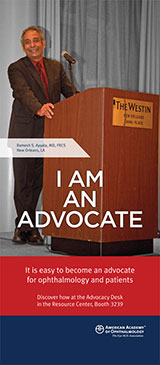 Surgery by surgeons. Safe surgery. You hear these buzz words quite a bit nowadays. It has been my passion as an educator to train young medical students into fine ophthalmic surgeons. In the process, I have realized the importance of proper training and the implementation of minimum standards of resident education. Upholding these standards is necessary to maintain patient safety.
Surgery by surgeons. Safe surgery. You hear these buzz words quite a bit nowadays. It has been my passion as an educator to train young medical students into fine ophthalmic surgeons. In the process, I have realized the importance of proper training and the implementation of minimum standards of resident education. Upholding these standards is necessary to maintain patient safety.
With this understanding, I went to work to find out the training imparted in optometry schools. I did this because Louisiana optometrists introduced a bill in the legislature that would give them the power to perform surgery.
My residents went through the websites and published data on the training imparted in various optometry schools. Optometrists go through a four-year course, during which they learn the basics of human anatomy, physiology and biochemistry during their first year. They learn about optics, refractive error evaluation and its treatment with glasses and contact lens, along with basics of ocular diseases such as glaucoma and cataracts during the rest of the three years. What is missing is any training in ophthalmic surgery skills.
A few optometry schools train their students to give injections around the eye using mannequins. This is in contrast to the training we impart to our residents, wherein they have to perform a required number of surgeries as primary surgeons on real patients, under the supervision of faculty, in addition to examining hundreds of patients with a variety of ocular pathology. The three years of clinical and surgical training that our residents undergo makes them safe surgeons and ensures patient safety.
Optometrists claim that many of the procedures that ophthalmologists perform are simple and can be learned over a weekend. Some optometrists are trying their best to convince the legislatures in various states that they have adequate training to perform most ophthalmic procedures. If this becomes a reality, it will compromise patient safety and put the future of my residents at risk.
It is the job of every ophthalmologist involved in resident training to educate their residents and get them involved in the fight against optometric surgery. It is important for program directors and chairs to testify in front of their legislature and educate lawmakers regarding the training required to be an ophthalmic surgeon. There are no shortcuts when it comes to surgical training. One should not dilute medical education or compromise patient care by allowing optometrists to perform surgery.
Ramesh S. Ayyala, MD, is a professor of ophthalmology at Tulane University School of Medicine.